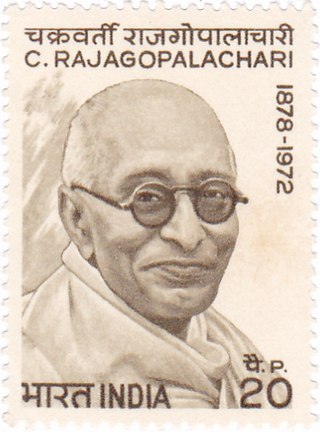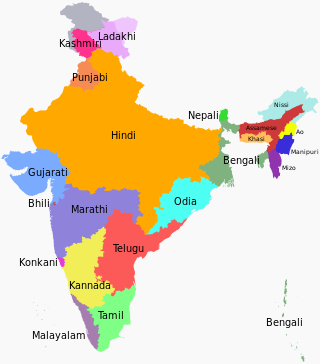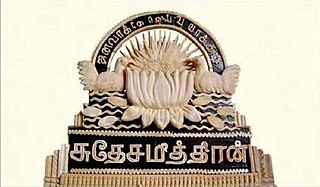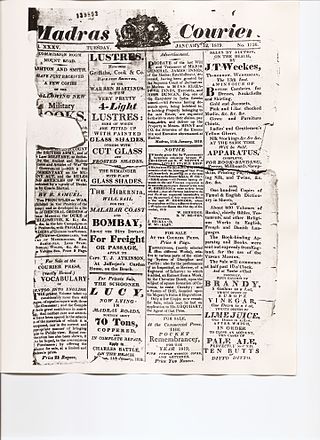
The Hindu is an Indian English-language daily newspaper owned by The Hindu Group, headquartered in Chennai, Tamil Nadu. It began as a weekly in 1878 and became a daily in 1889. It is one of the Indian newspapers of record and the second most circulated English-language newspaper in India, after The Times of India. As of March 2018, The Hindu is published from 21 locations across 11 states of India.

Chakravarti Rajagopalachari BR, popularly known as Rajaji or C.R., also known as Mootharignar Rajaji, was an Indian statesman, writer, lawyer, and independence activist. Rajagopalachari was the last Governor-General of India, as when India became a republic in 1950 the office was abolished. He was also the only Indian-born Governor-General, as all previous holders of the post were British nationals. He also served as leader of the Indian National Congress, Premier of the Madras Presidency, Governor of West Bengal, Minister for Home Affairs of the Indian Union and Chief Minister of Madras state. Rajagopalachari founded the Swatantra Party and was one of the first recipients of India's highest civilian award, the Bharat Ratna. He vehemently opposed the use of nuclear weapons and was a proponent of world peace and disarmament. During his lifetime, he also acquired the nickname 'Mango of Salem'.

Tulu is a Dravidian language whose speakers are concentrated in Dakshina Kannada and in the southern part of Udupi of Karnataka in south-western India and also in the northern parts of the Kasaragod district of Kerala. The native speakers of Tulu are referred to as Tuluva or Tulu people and the geographical area is unofficially called Tulu Nadu.

The Dravida Munnetra Kazhagam is a political party based in the state of Tamil Nadu and Puducherry

There is no national language in India. However, article 343(1) of the Indian constitution specifically mentions that "The official language of the Union shall be Hindi in Devanagari script. The form of numerals to be used for the official purposes of the Union shall be the international form of Indian numerals," while article 343(2) allowed for the continuation of English as an official language for another 15 years and 343(3) gave the parliament the power to provide for the use of English language after this period. The clause 3 of the Official Languages Act, 1963 allows for the continued use of English language for official purposes of the Union government and for parliamentary business. Hence Indian English and Modern Standard Hindi are the Official Languages of the Government of India.
Madras Bashai was the variety of the Tamil language spoken by native people in the city of Madras in the Indian state of Tamil Nadu. It was sometimes considered a pidgin, as its vocabulary was heavily influenced by Hindustani, Indian English, Telugu, Malayalam, and Burmese; it is not mutually intelligible with any of those except for Tamil, to a certain extent.

The Connemara Public Library at Egmore in Chennai, Tamil Nadu, India, is one of the four National Depository Libraries which receive a copy of all books, newspapers and periodicals published in India. Established in 1896, the library is a repository of century-old publications, wherein lie some of the most respected works and collections in the history of the country. It also serves as a depository library for the United Nations. It is located in the Government Museum Complex on Pantheon Road, Egmore, which also houses the Government Museum and the National Art Gallery.

The Madras Presidency or Madras Province, officially called the Presidency of Fort St. George until 1935, was an administrative subdivision (province) of India. At its greatest extent, the presidency included most of southern India, including all of Andhra Pradesh, almost all of Tamil Nadu and some parts of Kerala, Karnataka, Odisha and Telangana in the modern day. The city of Madras was the winter capital of the presidency and Ooty was the summer capital.

Swadesamitran was a Tamil language newspaper that was published from the then Madras city from 1882 to 1985. One of the earliest Tamil newspapers and the longest in print, Swadesamitran was founded by Indian nationalist G. Subramania Iyer four years after he had started The Hindu. The newspaper was sold to A. Rangaswami Iyengar of the Kasturi family in 1915 and the newspaper remained with them until its liquidation in 1985.

Dainik Bhaskar is a Hindi-language daily newspaper in India which is owned by the Dainik Bhaskar Group. According to the World Association of Newspapers, it ranked fourth in the world by circulation in 2016 and per the Indian Audit Bureau of Circulations was the eleventh largest newspaper in India by circulation as of 2022. Started in Bhopal in 1958, it expanded in 1983 with the launch of Dainik Bhaskar's Indore edition. The Dainik Bhaskar Group is present in 12 states with 65 editions in Hindi, Marathi, and Gujarati.
The anti-Hindi-imposition agitations in Tamil Nadu have been ongoing intermittently in the southern Indian state of Tamil Nadu since the early 20th century. The agitations involve several mass protests, riots, student and political movements in Tamil Nadu concerning the official status of Hindi in the state.

Ganapathy Dikshitar Subramania Iyer was a leading Indian journalist, social reformer and freedom fighter who founded 'The Hindu' English newspaper on 20 September 1878. He was proprietor, editor and managing director of The Hindu from 20 September 1878 to October 1898. Tamil language newspaper 'Swadesamitran' was also founded by him in 1882.
Madabhushi Rangadorai, better known by his pen name Randor Guy, was an Indian lawyer, columnist and film and legal historian associated with the English language newspaper The Hindu. He was also the official editor of the weekly column "Blast from the Past" that appears in The Hindu.

The Mail, known as The Madras Mail till 1928, was an English-language daily evening newspaper published in the Madras Presidency from 1868 to 1981. It was the first evening newspaper in India which is now operating as a news and media website.

The Madras Courier was the first newspaper to be published in Madras, Madras Presidency, British India and one of the first in India. It was the leading newspaper of its time and was the officially recognized newspaper for printing government notifications.
Andhra Patrika was a Telugu weekly newspaper of the nationalist movement founded by Kasinadhuni Nageswara Rao in 1908. It later transformed into a daily newspaper before it closed down in 1991. It helped to shape both modern Telugu language and an identity that resulted in the creation of the state of Andhra Pradesh.
Tamil Lexicon is a twelve-volume dictionary of the Tamil language. Published by the University of Madras, it is said to be the most comprehensive dictionary of the Tamil language to date. On the basis of several precursors, including Rottler's Tamil–English Dictionary, Winslow's Tamil–English Dictionary, and Pope's Compendious Tamil–English Dictionary, work on a more exhaustive dictionary began in January 1913 and the first forms were printed by the end of 1923. Initially estimated at ₹ 100,000, the total cost of the project came to about ₹ 410,000. The first edition had 4,351 pages in seven volumes, including a one-volume supplement, which were printed between 1924 and 1939 and had 104,405 words, with an additional 13,357 words in the supplementary volume, totaling to 124,405 words in all.
Madras Musings is a fortnightly English-language newspaper founded by Chennai historian S. Muthiah in 1991. Published in tabloid format and comprising 18 to 22 pages, the newspaper generally features articles on the history and heritage of Chennai city.
Pioneer or The Pioneer is the name of the following newspapers:
The Dravidian movement in British India started with the formation of the Justice Party on 20 November 1916 in Victoria Public Hall in Madras by C. Natesa Mudaliar along with T. M. Nair and P. Theagaraya Chetty as a result of a series of non-Brahmin conferences and meetings in the presidency. Communal division between Brahmins and non-Brahmins began in the presidency during the late-19th and early-20th century, mainly due to caste prejudices and disproportionate Brahmins representation in government jobs. The Justice Party's foundation marked the culmination of several efforts to establish an organisation to represent the non-Brahmins in Madras Presidency.











